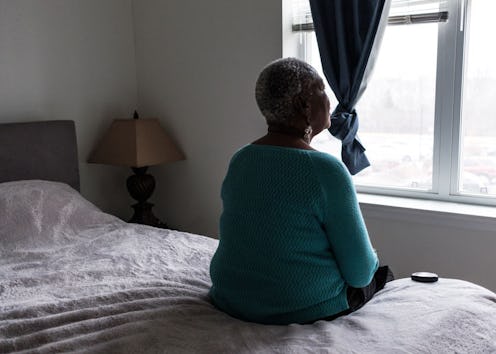Life
13 Early Warning Signs Your Grandparent May Be Depressed, According To Experts

Conversations surrounding mental health issues have opened up hugely over the last few years, with celebrities, sports stars, and the royals putting their names to different campaigns and charities that help the cause. It's very easy to find yourself buckling under the pressure that work, university, and young family life can bring, but what about the people who have got past that stage in life? There are actually signs that your grandparents may be depressed that you can watch out for, because the truth is, no matter what age you are, mental health affects us all.
It’s easy to assume that life after retirement is pretty chilled. No works means no stress, right? Well, research from Age UK actually shows that half of UK adults aged 55 and over have experienced depression and anxiety. And, of those people, 21% said their condition had gotten worse as they got older. Triggers for these conditions included the death of loved ones (36%) or dealing with ill health themselves (24%), as well as facing financial worries (27%).
Medical Director at Bupa UK Insurance, Dr Luke James, tells me:
“Mental health issues can affect us at any age, but depression tends to be more common among older people. Symptoms of depression can include a lack of self-confidence, loss of energy or motivation, weight loss, and trouble sleeping.”
Dr James explains that "a lack of awareness of mental health conditions among older people is leading a significant proportion of those aged 55 or older to neglect their wellbeing." He continues:
"Less than one in three over 55s feel confident in recognising the symptoms of conditions like depression and anxiety, causing them to keep problems bottled up and delay or avoid seeking help."
It may help, then, if you are able to watch out for signs of depression from a grandparents or elderly relative. HelpGuide, a nonprofit mental health and wellness website, suggests that the signs to watch out for in older people are as follows:
- Sadness or feelings of despair
- Unexplained or aggravated aches and pains
- Loss of interest in socialising or hobbies
- Weight loss or loss of appetite
- Feelings of hopelessness or helplessness
- Lack of motivation and energy
- Sleep disturbances (difficulty falling asleep or staying asleep, oversleeping, or daytime sleepiness)
- Loss of self-worth (worries about being a burden, feelings of worthlessness or self-loathing)
- Slowed movement or speech
- Increased use of alcohol or other drugs
- Fixation on death; thoughts of suicide
- Memory problems
- Neglecting personal care (skipping meals, forgetting medications, neglecting personal hygiene)
Seeing someone you love, like a grandparent, struggling can be incredibly painful, but Dr James emphasises the importance of getting a dialogue going. "Try to focus on how they’re feeling, rather than trying to solve the problem, as this will show them that you’re listening and you care," he suggests. "Sometimes opening up can be a huge relief to someone who is feeling depressed."
Dr James also points out that “early diagnosis is proven to significantly improve outcomes by aiding recovery, or educating and improving how a condition can be managed.” By listening to your grandparents and encouraging them to open up to you, a family member, or their GP about what they're experiencing, you may be helping them get on the road to recovery that much sooner.
This article was originally published on